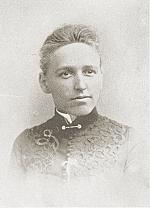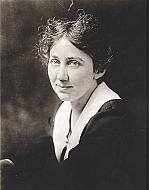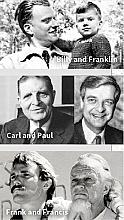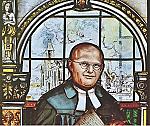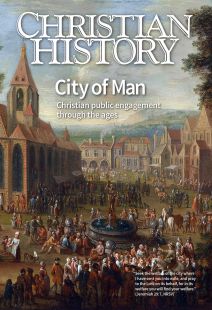Representative of the outcast
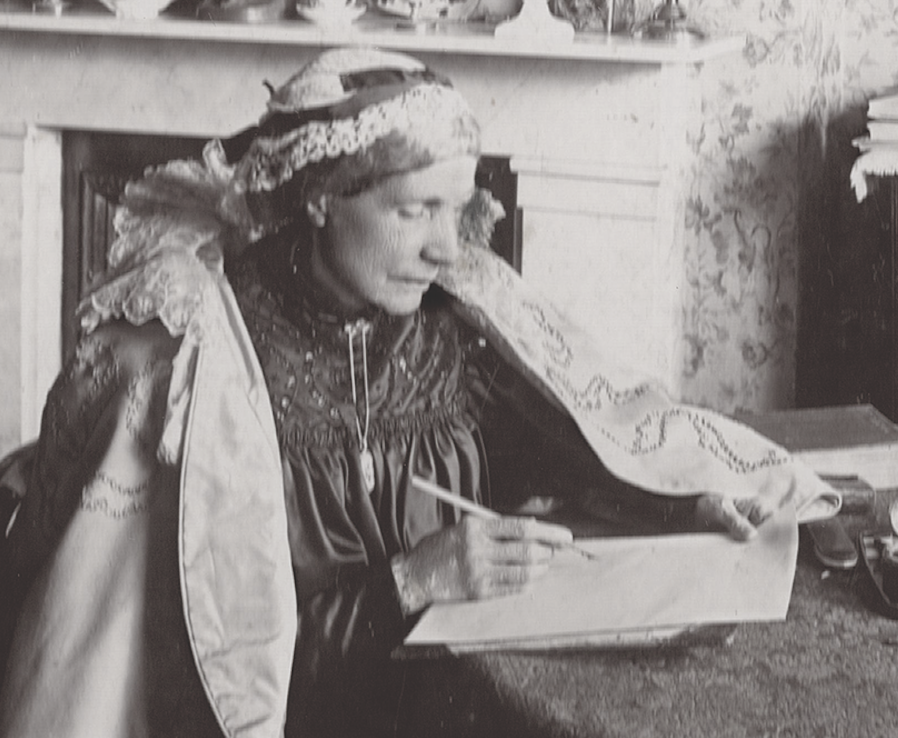
[Above: “Grannie writing her book”—LSE Library / flickr.com]
Imagine two people. One is the Victorian daughter of minor gentry, born into an English family with a tradition of social reform. Like the heroine of a novel, she is elegantly attractive, minimally educated, excels at painting and music, and gladly does her charitable duty to less fortunate neighbors. She is virtuous, kind, and self-possessed. The other is a fire-brand, reviled by members of the press as criminal, immoral, and the devil in disguise. They accuse her of a filthy mind and deep-dyed corruption. This notorious woman is the antithesis of Victorian femininity.
Now imagine one extraordinary individual as both characters. Josephine Butler (née Grey, 1828–1906) was the most surprising British heroine of the nineteenth century. At once iconic and iconoclastic, she was a complex, questioning Christian, whose activism and profound compassion changed her world.
At first Josephine’s life appeared utterly conventional. She married teacher and clergyman George Butler (1819–1890) in her early twenties. They had three sons and a daughter, and she settled into domestic life with grace and good humor. Yet she also found happiness elusive. Intensely intelligent, she felt frequently troubled by spiritual weakness. She struggled to reconcile the ineluctable evils of the world—slavery, poverty, sickness, and misfortune—with the concept of God as love.
Initially she grew angry with God, spending hours in the woods around her home, shrieking at him in frustration. With age came wisdom; she began to listen and thus developed a spiritual conversation through prayer that would last until death. It sustained and challenged her in equal measure.
“I, too, have suffered”
In August 1864 Butler suffered the defining tragedy of her life when her daughter, Eva, died. Exactly what happened is unclear; though she remembered the immediate aftermath of the accident, she could never bring herself to articulate the details.
The entrance hall of the Butlers’ home had a stone floor, a sweeping staircase, and a galleried landing. Five-year-old Eva was up in the nursery when she impulsively decided to rush down for a hug from her parents before dinner. Either she ran to the balustrade and overbalanced, or she toppled off while sliding down the banister (as all the children loved to do). Her skull fractured, and she died almost immediately.
The family was shattered. Butler’s conversation with God became more urgent than ever: “I long to have a hundred voices, that with all of them I might pray without ceasing that Christ will come quickly, and deliver forever the poor groaning world.” No one, she imagined, groaned with more sorrow than she.
Two things saved her from despair. Her upbringing taught her that sorrow should never be a vehicle for self-pity. She also had the emotional intelligence to realize that though happiness was out of her hands, at least she need not be lonely.
George Butler and the boys found solace in activity; she tried to do the same:
I became possessed with an irresistible desire to go forth and find some pain keener than my own—to meet with people more unhappy than myself. . . . My sole wish was to plunge into the heart of some human misery and to say (as I now knew I could) to afflicted people, “I understand. I, too, have suffered.”
“Courage, my darlings”
Butler had only to step outside their home in Liverpool and look into the eyes of the “fallen women” she found at almost every corner. Brownlow Hill workhouse sat nearby, where women convicted of public nuisance offenses were ”corrected.” Most of them were common prostitutes.
Like many Victorians Butler considered prostitutes to be sinners. But Butler’s refusal to condemn them for it set her apart, insisting instead that men who bought sex were at least as culpable as women who sold it. She also maintained that sinfulness is not endemic; it can be cured. “Courage, my darlings,” she would say to the most degraded of her new friends. “You are women, and a woman is always a beautiful thing.”
She was no collector of converts or savior of souls, but she became an evangelist who believed in the power of forgiveness. Butler made it her mission to convince the women among whom she worked that they could be forgiven, no matter how deep into the mire they had been dragged.
This could only be achieved through kindness and a recognition not of their outward state but of their essential human dignity. Meanwhile she and the rest of her family tended to their physical needs as well as their souls. They invited women into their home and, when that was full, secured accommodation and medical care elsewhere.
Once she had witnessed the power of change among her Liverpool destitutes, Butler’s appetite for social change sharpened, and she became one of Britain’s first high-profile agitators for women’s suffrage. She also supported campaigns for women’s higher education and legal rights. But one cause came to define her activism: the fight against the Contagious Diseases Acts (CDAs).
The British government passed three CDAs between 1864 and 1869. Their provisions were harsh. In an attempt to contain rampant levels of venereal disease in the British armed forces, any woman suspected of practicing prostitution in specified army camps and naval bases could be forcibly apprehended, registered, internally examined, and, if found to be diseased, incarcerated for up to three months in a “lock hospital” until healed by treatment with mercury—a desperately dangerous cure—or by time. No redress or right of appeal existed, and the authorities needed no proof to seize whomever they wished.
Butler was appalled. Not only were these laws inequitable, they were inhuman (she called the process of internal examination “steel rape”). With no precedent to guide her, she inspired a nationwide campaign, leading from the front by doing something that had rarely been done by a woman before and certainly not by a “lady”: speaking out in public.
Butler swiftly found fame as the slender, sweet-voiced lady from whose mouth issued the most devastating indecencies. She spoke graphically about the iniquity of treating women as “ticketed human flesh” (CDA inspectors issued them dockets to prove they were clean); and of comforting them after botched examinations as they lay weeping, lips white, hands blue, and petticoats drenched with blood. She accused supporters of the CDAs of oppression, blasphemy, and moral bankruptcy, blaming society for driving women ”as sheep to the slaughter into the slave markets of London.”
Predictably Butler met attack on several fronts. First in the queue were politicians, military personnel, medics, and moral vigilantes who designed and upheld the CDAs, some of them eager to extend the acts’ reach to the civilian population. Polite society was outraged by a female elbowing herself onto the public stage and spouting “obscenity.”
But women who relied on prostitution to support themselves and their families also did not understand Butler‘s anger regarding the tickets of “clean” exams given to them by CDA inspectors. Indeed this was never a straightforward battle between oppressive men and victimized women. Some of Butler’s strongest supporters were enlightened men; some of her most rancorous enemies, women.
Twin scourges
Brutal, physical abuse followed Butler. Opponents repeatedly hit and kicked her to the ground; on one occasion the building in which she was speaking was set ablaze. Her health began to fail, yet her spirit grew ever stronger, and Butler kept up the fight until the CDAs were effectively repealed in 1886.
By then she had embraced another mission: publicizing the twin scourges of human trafficking and sexual slavery. These were naturally subjects Victorian ladies were not even supposed to know about, let alone articulate. But Butler possessed uncommon courage, not only to spread the word but to campaign for change; it was the least she could do, she said, for her sisters in Christ.
After 1890 Butler made few public appearances, preferring to “help with my pen” instead. She wrote numerous books and pamphlets, but inevitably moved out of the spotlight (and in time off the stage altogether). She never lost her acute political awareness, however, nor the urge to do what she could to make life better for others, whatever the scale of the problem.
Most people who know Butler’s name are aware of her CDA and human trafficking campaigns. They were heroic. What emphasizes her humanity, however, is the knowledge that she used to donate whatever she could to a local dogs’ home; that her children liked to festoon her beloved horse with daisy-chains before she rode him; and that she wrote cheerfully to the criminally homosexual Oscar Wilde to comfort him in prison, imagining how lonely he must be.
She was kind on many levels and entirely non-judgmental. Butler has been described as “one of the great people of the world.” Her own epitaph is more telling. She described herself as a simple woman, invited by God to be “the representative of the outcast.” It was the greatest privilege of her life to accept. CH
By Jane Robinson
[Christian History originally published this article in Christian History Issue #141 in 2021]
Jane Robinson is the author of 12 books including Josephine Butler: A Very Brief History.Next articles
Brave medical and theological sister
As doctor, activist, and ultimately theologian, Katharine Bushnell sought to improve women’s lives
Kristin Kobes Du MezThe needs of the worker
Working-class civic engagement helped catalyze the rise of the Social Gospel
Heath W. CarterPreaching and practicing
Fathers and sons shaping the common good—sometimes very differently
Aaron GriffithThe cost of discipleship?
Bonhoeffer’s commitment to the Word against the state led him to shocking conclusions
Michael P. DeJonge



